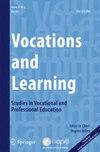职场教育者如何评估学生在工作场所的表现?定性系统评价
IF 1.8
2区 教育学
Q2 EDUCATION & EDUCATIONAL RESEARCH
引用次数: 0
摘要
摘要职业教育的目的之一是通过培养学生成为成功的实践者的能力,对学生进行职业教育。在接受教育期间,学生通常会获得工作经验。在这种情况下,学生在学校和工作场所都学习。工作场所的学习需要评估,但这与学校的评估不同,因为在哪里(工作场所)、如何(通过参与)和学生学习什么(归属、成为和存在的过程)。在工作场所,学生通常被分配一个教育工作者,他承担着教育工作者和评估者的双重角色。这篇综述从社会文化的角度来看待工作场所的学习,并从这个角度汇集了已经知道的工作场所教育者如何通过定性的系统回顾来评估学生的表现。我们的分析旨在使用迭代主题分析进行叙事综合。研究结果显示,职场评估体现在日常工作中,并受到人际关系的影响。工作场所的教育工作者从事与评估相关的持续互动过程。他们更喜欢使用嵌入在职业社区规范和价值观中的标准,而不是学校规定的标准。工作场所评估需要协商标准和真正的协作评估实践。这些实践可以有目的地共同设计,并且需要学校和工作之间的密切沟通。这一审查表明,职业教育工作场所绩效评估可以被概念化为一种实践,这种实践是由嵌入其中的特定工作场所形成的。从这个角度出发,评价可以得到阐释和认可,从而在评价研究和职业教育研究中得到进一步的概念化和研究。本文章由计算机程序翻译,如有差异,请以英文原文为准。
How do workplace educators assess student performance at the workplace? A qualitative systematic review
Abstract One aim of vocational education is educating students for occupations by fostering the development of students’ capacities to become successful practitioners. During their education students are usually afforded work experience. When this is the case, students learn both at school and at the workplace. Learning at the workplace requires assessment, but this differs from assessment at school because of where (at the workplace), how (through participation) and what students learn (a process of belonging, becoming and being). At the workplace, students are usually assigned an educator who takes on the dual role of educator and assessor. This review takes a sociocultural perspective on learning at the workplace and from this perspective brings together what is already known about how workplace educators assess student performance through a qualitative systematic review. Our analysis aimed for narrative synthesis using iterative thematic analysis. The results depict workplace assessment as manifested in day-to-day work and shaped by relationships. Workplace educators are engaged in a continuous process of assessment-related interactions. They prefer using criteria that are embedded in the norms and values of their vocational community, rather than criteria prescribed by school. Workplace assessment requires negotiated criteria and truly collaborative assessment practices. These practices can be purposefully co-designed and require close communication between school and work. This review shows that assessment of workplace performance in vocational education can be conceptualised as a practice that is shaped by the specific workplace in which it is embedded. From this perspective assessment can be explicated and acknowledged, and as a consequence be further conceptualised and researched in both assessment research and vocational education research.
求助全文
通过发布文献求助,成功后即可免费获取论文全文。
去求助
来源期刊

Vocations and Learning
EDUCATION & EDUCATIONAL RESEARCH-
CiteScore
5.30
自引率
17.90%
发文量
21
期刊介绍:
Vocations and Learning: Studies in Vocational and Professional Education is an international peer-reviewed journal that provides a forum for strongly conceptual and carefully prepared manuscripts that inform the broad field of vocational learning. The scope of the journal and its focus on vocational learning is inclusive of vocational and professional learning albeit through the very diverse range of settings (e.g. vocational colleges, schools, universities, workplaces, domestic environments, voluntary bodies etc) in which it occurs. It stands to be the only truly international journal that focuses on vocational learning, as encompassing the activities that comprise vocational education and professional education in their diverse forms internationally. Vocations and Learning aims to: enhance the contribution of research and scholarship to vocational and professional education policy; support the development of conceptualisation(s) of vocational and professional learning and education; improve the quality of practice within vocational and professional learning and education; and enhance and support the standing of these fields as a sectors with its own significant purposes, pedagogies and curriculums. Vocations and Learning: Studies in Vocational and Professional Education encourages the submission of high-quality contributions from a broad range of disciplines, as well as those that cross disciplinary boundaries, in addressing issues associated with vocational and professional education. It is intended that contributions will represent those from major disciplines (i.e. psychology, philosophy, sociology, anthropology, history, cultural studies, labour studies, industrial relations and economics) as cross overs within and hybrids with and amongst these disciplinary traditions. These contributions can comprise papers that provide either empirically-based accounts, discussions of theoretical perspectives or reviews of literature about vocational learning. In addition, books, reports and policies associated with vocational learning will also be reviewed. Topics addressed through contributions within the proposed journal might include, but will not be restricted to: curriculum and pedagogy practices for vocational learning the role and nature of knowledge in vocational learning the nature of vocations, professional practice and learning the relationship between context and learning in vocational settings the nature and role of vocational education the nature of goals for vocational learning different manifestations and comparative analyses of vocational education, their purposes and formation organisational pedagogics transformations in vocational learning and education over time and space analyses of instructional practice within vocational learning and education analyses of vocational learning and education policies international comparisons of vocational learning and education critical appraisal of contemporary policies, practices and initiatives studies of teaching and learning in vocational education approaches to vocational learning in non-work settings and in unpaid work learning throughout working lives relationships between vocational learning and economic imperatives and conceptions and national and trans-national agencies and their policies.
 求助内容:
求助内容: 应助结果提醒方式:
应助结果提醒方式:


